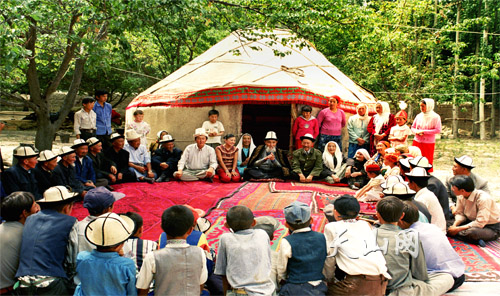Centuries-old epic endangered
 0 Comment(s)
0 Comment(s) Print
Print E-mail Xinhua, December 3, 2012
E-mail Xinhua, December 3, 2012
|
|
| Yusup Mamai (C), 94, is the only living Manaschi, a singer of the Kirgiz "Epic of Manas," who can rhythmically chant the entire epic poem from beginning to end from memory. [File photo] |
Urgent need for protection
The central and regional governments have allocated 10 million yuan (1.61 million U.S. dollars) in special funds for the inheritance and protection of the epic.
Since May 2007, 10 Manaschi trainees and 10 players of Kumuzi, a stringed instrument played to accompany the epic, have been sent to hone their skills with more advanced Manaschi each year. They receive a monthly wage of 500 yuan and a 600-yuan year-end bonus.
Inheritors of the epic on the national and regional levels receive monthly subsidies ranging from 240 yuan to 1,000 yuan, staff with the regional culture department said.
The Xinjiang Autonomous Regional Federation of Literary and Art Circles set up a Manas research center in the 1990s to collect and edit related material.
The Mandarin edition of the first episode, which contains 53,000 lines, come out in 2007. The second book is currently being edited and will soon be published.
Ma Xiongfu, vice president of Xinjiang Federation of Literary and Art Circles, said the Mandarin version will allow more Chinese people to learn about Manas and serve as invaluable research material on the history and culture of ethnic minorities in Xinjiang.
As one of the translators, Ma said nobody has translated the original charm of the "Epic of Manas" into Mandarin yet.
Meanwhile, more difficulties remain despite protection efforts.
Governments at the regional, prefectural and county levels, as well as universities and non-governmental organizations such as the Federation of Literary and Art Circles, are simultaneously carrying out Manas preservation work, but each in its own way, said Ma.
"Resources are not utilized. Departments that have funds don't know how to use them and carry out effective policies, while non-governmental organizations and talented people don't have enough money to help," Ma added.
Mametjuma Mametakun, a Manaschi with the song and dance ensemble of Kirgiz Autonomous Prefecture of Kizilsu, said younger generations are not willing to learn the epic poem.
"Children love the story of the heroic Manas when I tell it to them, but they only want to listen," he said.
"Manas is unique because we express emotions with exaggerated body movements. When we sing to the settings of war, we imitate the horses' neighs, the soldiers' shouts and Manas's heroic posture," Mametakun added.
Adel Jumaturdu, a researcher at the Chinese Academy of Social Sciences, said learning both the song and the movements requires a long-term commitment, and the government should provide aspiring Manaschi with higher subsidies and job opportunities in song and dance ensembles and culture departments to encourage them to improve their skills.
"Singing the epic is the only way to keep it alive. Printing the text can only serve academic research purposes," said Adel Jumaturdu.
To cultivate an audience, Tolanhan, a political advisor to the government of Akqi County, suggested setting up a museum to make the history of, and artifacts related to, the epic available to the public.
Public spaces where professional singers, Kumuzi players and Manas lovers can meet regularly to perform, learn from one another and exchange their ideas should be set up, as well, said Adel Jumaturdu.







Go to Forum >>0 Comment(s)